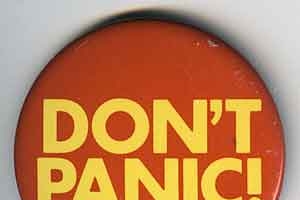How to Overcome Fear of Failure
7 tips to help you escape your comfort zone
 "Take the leap!" courtesy of mckimg
"Take the leap!" courtesy of mckimgFear of failure had him stuck as fast as a guy in a '50s jungle movie struggling waist deep in quicksand.
Sure Josh could talk the talk, but as for walking that talk? He'd never get past crawling. Despite all kinds of excuses to anyone who'd listen, it all boiled down to fear of failure.
I'd wanted Josh to be brutally honest with himself and me. At first he waxed on about why he hadn't gone for promotion, spoken to an attractive woman at his tennis club (or even kept up playing tennis), started a business when he'd had good opportunity. But bit by bit, the real pattern of what had been happening emerged.
"I think, basically, the thought of failing anything terrifies me!"
Ah, now the beast was recognized! And it lay not without, but within him. But what exactly does it mean to fear failure?
What is fear of failure?
Fear of failure is closely linked to fear of rejection and criticism from others, as well as to procrastination and excuse making. You can always create an excuse not to do anything, no matter how potentially valuable and rewarding. It's just whether you choose to believe those excuses.
The great 'psychologist' Will Shakespeare summed it up pretty well four hundred years ago: "Our doubts are traitors, and make us lose the good we oft might win by fearing to attempt." He could have been talking directly to Josh - to many of us.
Fearing failure to the point that we don't even try something prevents us from ever truly knowing what we might just be capable of.
The quicksand of life
The trouble happens when you know you aren't really satisfied with the way things are, but you feel that trying to improve things is just too big a risk - back to our 1950s jungle movie quicksand. And for 'quicksand' read: depression, frustration, even self-contempt.
Of course it might, sometimes, be more sensible to fear the consequences of failure and therefore not try. Only an idiot thinks that one rule (it's better to try than to not even attempt) applies to all circumstances. If I'm blind drunk (which I'm not, by the way), I might assume I can drive my car perfectly well; that's when I actually need a hefty dose of self-doubt.
But for someone like Josh, whose life was littered with discarded opportunities, even safe risks (if that's not a complete contradiction) were a leap of faith too far. He'd got into the habit of not attempting stuff. His days became increasingly uniform, the same routines over and over. Josh's 'comfort zone' had become a velvet prison.
Why is it that some folk are so shackled by fear of failure that they seldom, if ever, test their potential?
Reasons for fearing failure
Fear of failure carries its own risks - one of which is a regretful and frustrating life. Here are some possible causes for fear of failure:
- The person may be such a perfectionist that anything less than perfection on a first attempt seems like dismal and humiliating failure and can't be tolerated. To succeed, we must be prepared and able to fail. Weirdly, successful people may be just as comfortable with failure as they are with success.
- They may have been the unwitting victim of someone else's perfectionism, harshly criticized by demeaning parents, teachers, friends, or colleagues, and have internalized those outside expectations.
- Failure came to be seen as a statement about who they were as a person (rather than what their approach to a particular attempt had been like).
- They had been embarrassed by an actual or perceived failure and felt traumatized by this to the extent that they now fear to attempt anything new.
- They may misconceive self-confidence. Truly confident people aren't the ones who know for sure they'll succeed; they're the ones who know they'll handle failure if it happens.
- They may naïvely assume that success always happens without many failed attempts along the way (we all see the relative success of celebs, but we don't see the hidden part of their story, such as knockbacks). They want success without risk or difficulty.
If you feel fear of failure has been holding you back, take a chance on these tips.
1) Remember 'failure' is a relative term
If I take a degree in Spanish, I might study for a few years and learn a great deal of Spanish, but for some reason not get the degree I so wanted. Is this a total failure? Or is it a partial success? I might, as a result of that study, now be able to chat wittily to the locals in sunny Spain.
A failure on one level is often a success on another, when we're less black-or-white about it. The Scottish pharmacologist Sir Alexander Fleming succeeded in accidentally discovering penicillin (which has indirectly saved hundreds of millions of lives) through failing to clear away cultures of staphylococci on a bench in a corner of his laboratory.
Failing in law school might be the catalyst for a successful career in stand-up comedy, who knows? Loosen up your thinking around what constitutes 'success' and 'failure'. Few things are absolute. A relationship, for example, can 'work' but still have ups and downs, still have little failings.
2) Don't take it all personally
People are more at risk of developing depression if they internalize bad stuff, assuming they are personally and solely responsible when a relationship ends or when a business venture doesn't get off the ground. If something doesn't work the way you wanted it to, ask yourself: "Okay, what factors outside of my control contributed to this not working?" Was it the economy? Was it the large geographical distance in the relationship? The fact that the bank didn't lend the money they said they would?
See your responsibility as a realistic part of the picture - not the whole picture itself. And if you were totally responsible, what mitigating circumstances might there be (the fact that a newborn kept you awake all night before your exam)? Externalizing bad stuff makes the prospect of 'failure' less daunting than feeling that if you fail it means you're a total idiot.
This isn't about dodging blame, but objectively seeing when outside factors influenced an undesired outcome.
3) Forget about 'failure/success'
Once upon a time, when you were tiny, you didn't fear failure because 'failure' was something that you hadn't yet learned as an idea. Part of the trick in overcoming paralyzing fear of failure is to return to some of that innocence and forget about 'failure' and 'success'; just enjoy the process of seeing how far you can take something. This is what happens when people flow into 'the zone' in which all thoughts of past or future disappear into one timeless moment of pure present focus.
4) No failure; only feedback
Yes, I know this one's a cliché, but it's true. We learn what works by what doesn't. If we don't try, we don't learn. Early humankind didn't just invent the production of fire. Many attempts - perhaps some of them retrospectively ridiculous - had to be made. But the end was always kept in mind.
Keep an open mind. Think in terms of 'feedback' and 'results'. A good scientific researcher will see results from a study, rather than success or failure; results that need to be considered objectively.
If something doesn't work, great! Now you know to do things differently. Successful sports or business people need to do the same: "What happened here? How can that be improved? Which bits worked better than others?"
Forget 'failure', which is, sometimes, just the name of the landscape you need to travel through to find eventual success. Remember, truly confident people aren't the ones who know for sure they'll succeed; they're the ones who know they'll handle failure if it happens.
5) Be bold, take action
Get into the habit of seeing how much you can 'fail' at. Take classes, learn something, try new things; it's a numbers game. Put yourself out there and get used to attempting stuff. The most successful people are often just the ones who try the most things.
Avoidance of opportunity is no way to travel through life. What people forget is that to speed up your rate of success, you need to quicken your rate of failure - not always try to avoid it through inaction. And if you predict you'll fail at something and then you do, you'll have actually succeeded in your prediction - something that UK weather forecasters don't seem to be too hot at.
6) Know what success means for you
Fear of failure so often means fear of failing other people's expectations, which, deep down, might not be your idea of success. What does success mean to you? A sense of meaning and purpose helping others? A healthy body and good friends? A place in the sun? Mastering an activity?
For many, success has come to mean the acquisition of wealth, but we know that gaining more and more money (after about £50,000/$80,000 a year) in income doesn't make us increasingly happier. Really think about what you would feel to be successful and bear in mind it might not look like success to some others.
After all, it's your life.
7) Envisage attempting in the best way possible
If your attempt is as good as it can be and you still fail (perhaps because of outside factors), then remember the attempt was a success.
When I work hypnotically with someone who is nervous about taking their driving test, I don't get them to visualize passing their test. When working with the nervous job interviewee, I don't get them to 'see themselves' being offered the job. Why? Because this is not the right focus.
I can't make the driving examiner pass my client, but I can help my client be suitably calm and focussed during the test itself. We focus on making the attempt as successful as it can be and let the outcome of that attempt take care of itself. Forget eventual outcomes and focus on attempting well.
Think of something you have been afraid of attempting through fear you might fail.
And what of Josh, who felt pressured to get a mortgage and a company pension but really wanted to pursue something else, who had to learn to see his own dreams as more valid than ones placed upon him from outside? He felt he didn't have the nerve, but it turns out he did. The last I heard, he'd escaped the choking quicksand of doubt and was simultaneously running a school for would-be Hollywood stuntmen and had started a charity for a cause close to his heart.
Success comes in many sizes and each one of us needs to find our perfect fit.
10 Steps to a Stellar Success Mindset course
Let hypnosis drive success habits deep into your unconscious mind...







